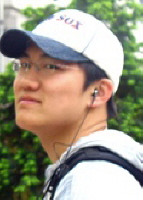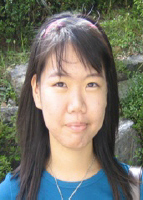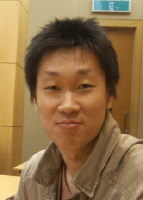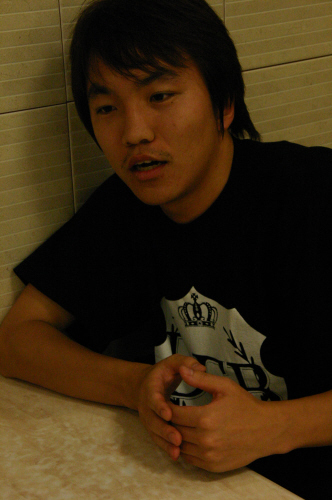What do you think of the ‘Sandwich phenomena’? We got some ambitious, various, and deep answers from
S# 1. Never Ending Disscussion?
CAH and three university students met at an online chatting window. From the beginning to end of discussion, there were little chance or need to intrude. Below is the record of the discussion.
CAH: Nice to meet you. Thanks for complying with our interview. Now, please feel free to say your opinion. Let’s start with the ‘Sandwich phenomena’ then. What do you think?
Lee Dae-gun(Lee): In the case of Korea, because ‘foreign trade’ accounts for pretty much all of our profit, it is highlighted. The quantity of trade has increased but quality has not upgraded.
Joo Bo-eun(Joo): By the way, why did it become so severe? Is there any special reason that we could not have chased Japan’s technology?
Seo Hong-suk(Seo): Korea has not grown enough. After achieving a higher Gross National Income(GNI) per capital which was estimated over 10,000 dollars, we have not been able to accomplish a 20,000 dollars GNI per capital for 12 years.
CAH: Why didn’t it grow?
Joo: Well, because of investment shortage?
Lee: Yes. Korea has too strict restrictions and it has interrupted investment. Moreover procedures are complicated and the Metropolitan area’s regulation is especially severe.
Seo: Investment and employment rates go up only when domestic demand increases. It is merely thanks to export rates that we could maintain a 4% growth rate. However, now this ‘export’ has been meeting a crisis, too.
CAH: Is it a result from the absence of a ‘new growth industry’?
Joo: Korea-China-Japan’s key industries are almost the same. That is the problem. We should find a Blue Ocean industry.(Blue Ocean means untapped and/or uncontested markets, which provide little or no competition for anyone who would dive in, since the markets are not crowded.)
Lee: Korea is especially weak for a Blue Ocean industry. When a new industry comes up, the Blue Ocean market disappears very quickly.
Joo: If one is discovered, everyone takes advantage of it completely…ha-ha. Of course sometimes it can be a strong point, too.
Seo: We should find a new growth industry with creative ideas and innovating enterprises.
CAH: How about bio technology?
Seo: It needs a lot of investment, but Korea lost its reputation because of the Hwang Woo-suk incident(His ‘stem cells thesis’ research was a forgery). After the incident, there was nothing to show in fact for the industry.
Joo: However, bio technology is an important industry having a huge potential. It would be beneficial if we overcome this stagnation.
Lee: When Hwang’s incident occurred, I thought that the press had over-criticized him. It was expected that a positive outcome was coming up but this did not happen. Anyway, the problem of the Korean press, which intensifies crisis, is a continuing problem these days, too.
CAH: In the first half of this year, according to statistics, the ‘Sandwich phenomena’ became true in the trade industry. How will it be in the future?
Seo: It can be really true. We have to be ready thoroughly.
Lee: Do we need to develop a ‘trade format’ which is suited to each country?
Seo: We should not live peacefully unaware, but be aware of the problems that we need to face.
Lee: Companies that have many overseas branches have already invented suitable products.
Joo: These are all just worn out ideas. Do we read ethics book?
Seo: (do not mind.) And we should consider the way that other countries fail and succeed. Taiwan’s failure or Benelux’s success from opening-policy can be examples.
CAH: Well, now let’s talk about university students’ ‘Sandwich pressure’. With your experience, please say your opinion about today’s state of students.
Joo: When I entered university, I would take an administration test or a judiciary test. However, through the activities of environment organizations, I could reconsider what I was going to do. Becoming a public servant and arranging desk theories were not what I wanted. When seeing younger men who prepare for those kinds of tests excessively, I’d like to ask them what they really want to do in the future.
Lee: I went to China for training 2 weeks ago. Every member had a different experience and we shared each other’s story. It was really helpful. No matter how tough seeking a job is, experiencing the ‘real world’ is a much better way than just filling out a resume.
Seo: I have joined many conferences that so-called ‘leaders’ of each field have come from. Through communicating with field experts, I could become confident. These days, students look very busy but they really don’t know what to do.
People have said with one voice that they did not start their actions to gain ‘something’. The starting point was not easy, but experience made them more passionate. Even during this crisis of ‘Sandwich’, these three young men have been able to carry out their ambitions. Our ‘CAH 100-minute discussion’ with them was so hot and it seemed never ending.

- Main staff of ‘Kepitez’ (University student federation)
- Hankuk Univ. of Foreign Studies Faculty of Business Administration junior
- Chung-Ang Univ. Law junior

- Chung-Ang Univ. International Relations senior
S# 2. “We can change pressure to pleasure.” (with university student reporters)
CAH: Due to the worsening job markets, university students are feeling pressure from their early school days.
Lee Seung-ho(Lee): Though every student wants better work, employment is insufficient, especially, the so-called ‘good work’. There simply are not enough jobs to get. These days the economic slump has accelerated this trend. It is quite sad that students feel so much pressure about employment.
Lee Jeong-min(Jeong): I think that it is not a good idea to call getting a job, as the same as ‘feeling pressure’. Students have to manage to keep grades(which are good enough to be hired) because that is what they have to do being student. In case of internship or studying abroad, it would not be pressure any more, if one enjoys what they do instead of considering their experience as a means to fill out a resume.
Paik Gun-ho(Paik): Students have to do that even though they do not want to, because companies demand those activities, which we can call ‘forcible spontaneity’.
CAH: How can university students get out of this pressure?
Lee: I do not think that ‘growing ability’ and ‘growing career’ are the same concept. These days, students can grow a career for showing off, instead of achieving self-reliance. It is desirable to grow career in every vacation, but it would be much better to read and study for oneself. Doesn’t it upgrade one’s real competence?
Jeong: First, students should decide one’s goals clearly. When we do not want to but have to do it, we feel ‘pressure’. We should bring motivation and go forward. Then it might be ‘pleasure’.
Paik: If one abandons thoughts of entering famous enterprises and decides to do other works, (run own business or become artist, etc) they can get out of the sandwich press. And if one works for one’s own interest and career, side-by-side, it would be the best.
CAH: How do you think about the future of the ‘Sandwich phenomena’?
Lee: Neo-liberalism demands endless competition from people. (That is why I am against it.) However, it is an important fact that this trend is undeniable. It means not only Korea but also other countries will experience the pressure too.
Jeong: In case of university students, I say… Lately, companies concentrate on and tend to employ the ‘creative elite’. For example, one who traveled to an African desert for 3 months would be preferred in a company. Perhaps it will be a new pressure that people have to be creative elite.
Paik: After many decades, this pressure may be diminished because of decreased birth rates. However, obtaining the preferred jobs will continue to be hard to catch. I’d like to annex that every young man has wandered about their lives. It is important to get through it.
PEOPLE WHO JOINED…
- Lee Seung-ho / Korea Economy Newspaper intern reporter, Seoul National Univ. Sociology Dept. sophomore.
- Lee Jeong-min / Korea Economy Newspaper intern reporter, The National Assembly Internship, Inha Univ. Social Science faculty freshman,
- Paik Gun-ho / Campus Life 4th reporter, Chung-Ang Univ. English Education Dept. junior.
S# 3. “Preventing capitalizing would be a solution.”(with one economics student)
CAH: What is your opinion of highlighting ‘Sandwich Korea’?
Han Jae-young(Han): Actually, it started after the Korean War, 1945. Since then, China has adopted market socialism and developed rapidly. And Japan has maintained high-level technology techniques. It might come up again because of economic difficulty in the country.
CAH: Then how can we solve it?
Han: I’m not an expert so I’d like to suggest an indirect solution. After the Vietnam War, the international economy has changed into a capital-oriented economy. Including Korea, all countries want to ‘be capitalized’. However, capitalizing is for only a small number of capitalists. In fact, a lot of people who are not capitalist do not feel economic growth. It might make the pressure we feel these days worse. I think that ‘preventing capitalizing’ would be an indirect solution.
CAH: What do you think about the need for developing a ‘new industry’?
Han: It is really hard to judge. New industry requires a systemically organized plan and countries which have national hegemony are able to do that. Now in Korea, it is hard to see such industry. In the case of IT, Korean technology has overtaken that of United States since 1990s but lately it is losing its reputation.
Han Jae-young, Chung-Ang Univ. Economics Dept. senior.



